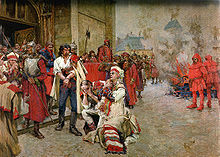- Matija Gubec
-
 A representation of the execution of Matija Gubec in front of St. Mark's Church in Zagreb, by Oton Iveković
A representation of the execution of Matija Gubec in front of St. Mark's Church in Zagreb, by Oton Iveković
Ambroz "Matija" Gubec (Hungarian: Gubecz Máté) (before 1556 – 15 February 1573) was a Croatian peasant and a revolutionary, best known as the leader of the Croatian-Slovenian peasant revolt. Before the revolt, Gubec was a serf on the estate of the landowner Franjo Tahy.[1]
When the revolt erupted, the peasants elected Matija Gubec to be one of the leaders, and renowned for his personal qualities, he became the most influential leader of the rebellion.[1] During his brief tenure he showed ability as a capable administrator and inspiring leader that would later create a legend. He earned the nickname Gubec Beg.[1]
Matija Gubec led the peasant army during its last stand at the Battle of Stubičko Polje on 9 February 1573. Before the battle he made a speech trying to convince the men that only victory could bring them freedom, while the defeat would bring more misery. After the defeat he was captured and taken to Zagreb. On 15 February, he was publicly tortured, forced to wear a red-hot iron crown and was subsequently quartered.
While Matija Gubec's cause was defeated, his legacy continued to be preserved in local folklore throughout the centuries. In the 20th century, Josip Broz Tito and the Yugoslav Partisans embraced his cause as their own. During World War II, a Croatian and a Slovenian Partisan brigade were named after him.[1] He is also depicted as the protagonist of Gubec Beg, one of the first rock operas in modern Croatia. A museum of Croatian-Slovenian peasant revolt led by him is founded in Oršić Castle in Gornja Stubica, near the place of his last battle.
References
Categories: Croatian rebels | 1573 deaths | People executed by hanging, drawing and quartering | 16th-century executions | Croatian torture victims | Executed Croatian people
Wikimedia Foundation. 2010.
